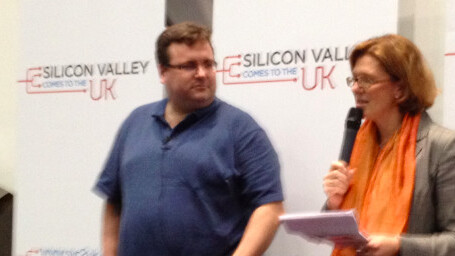
Two days ago, 800 people assembled at a south London art college for Silicon Valley Comes To Tech City, an event which saw experienced entrepreneurs and investors from America’s tech mecca engage in an afternoon of fast-paced panels and interview sessions with the aim of inspiring the UK’s next generation of startup founders.
The event is part of a wider initiative, Silicon Valley Comes To The UK, organized by LinkedIn co-founder Reid Hoffman and angel investor Sherry Coutu. Once a year, speakers from Silicon Valley are invited to the UK to talk to students, the government and entrepreneurs about how to produce bigger, better tech companies.
Inspired by a similar event at Oxford University, Hoffman and Coutu’s philanthropic endeavour has gradually spread nationwide from its beginnings in Cambridge. In the past four days, Coutu said that 20,000 people have attended related events – either as part of the main program or at spin-offs held at universities across the country.
With London’s TechCity zone, a loosely defined area receiving government support and investment as a hub for the technology industry, gaining traction as a concept, it was little surprise to see Silicon Valley Comes To The UK hold a dedicated event for the area.
With four strands taking place simultaneously, it was impossible to see everything, but some common themes emerged throughout the talks we attended, with advice for both entrepreneurs and the UK as a whole.
Advice for startups
Talk to every smart person you can find: Reid Hoffman explained the importance of not keeping your ideas secret. While you may think that sharing your startup plans with other will lead to someone copying it, feedback is vital to honing your idea into something that will work. When he started LinkedIn in 2003, people told him that a social network for every professional on the planet was a crazy idea that would never work, but listening to others’ opinions helped the founding team launch a successful product.
Design is more important than ever: We’ve already published a full report on the panel discussion about product design for startups. It was a fascinating conversation and the writeup is well worth reading to discover how to create designs that truly connect with your users.
Learn from the non-profit sector: The way non-profit organizations are run can offer useful lessons to startups, as a session featuring Julie Hanna of Kiva and Nancy Lublin of Do Something revealed. These include:
- Inflated titles: Like a non-profit, you may not be able to pay someone a huge salary but you can give them a job title that looks great on their CV. Make someone a ‘director’ of a part of the business and it not only makes them feel good but it can help them walk into a bigger job at that level elsewhere later.
- Don’t hire people mainly motivated by money: As a founding team you need a sense of purpose and passion deeply internalized, and having people who are just looking to get rich can be a problem – hire people who believe in your vision and want to change the world.
- Don’t be scared to choose passion over experience: Non-profits are often forced to hire cheaper staff than they’d like as they simply don’t have the funds to pay more. This can be a good thing. Staff with high levels of experience are less likely to produce disruptive, innovative thinking. The more someone knows, the more self-limiting they can be. Having someone who doesn’t have a well-ingrained idea of ‘how things are done’ can be a real benefit.
- Leverage your community to help build your product: Don’t just rely on salaried staff; your most enthusiastic early users can help you develop your product by translating it into other languages and other tasks you may not have the time and resources to do in-house.
Advice for the UK
Education’s getting in the way of learning: In the opening panel discussion, the point was made that if a teacher from the Victorian era came to a modern school, they would see that not much had changed. Given the huge changes to society and technology in the past century, that’s surprising. Joi Ito, director of the MIT Media Lab, said that the institution’s most popular class is ‘How to build almost anything’, where students are free to explore knowledge through creativity.
The view of the panel was that serendipity and discovery should be a far greater part of the educational experience.
Embrace failure: It’s a common criticism of Europe that failure is seen as a bad thing, whereas in the USA it’s viewed in a more positive light. Jon Callaghan, a VC with True Ventures, explained that the UK had a cultural problem of the acceptance of risk. That’s not just among company founders and investors, it affects recruiting, he said.
He argued that the tech sector needs to work out how to persuade risk averse, but highly talented, software engineers out of well paid jobs with the likes of banks to take the leap into a lower-paid job with a startup. Callaghan even said that he was “excited by failure,” as it opens up new opportunities based on recently acquired experiences.
Get the TNW newsletter
Get the most important tech news in your inbox each week.



